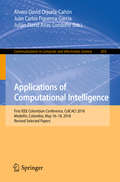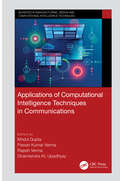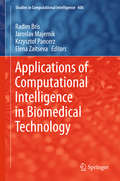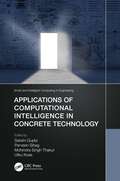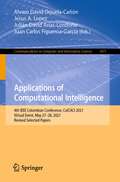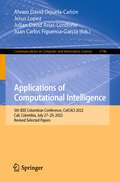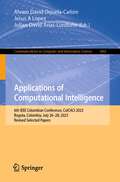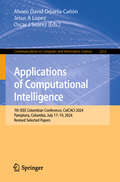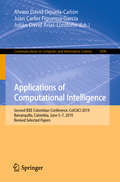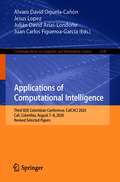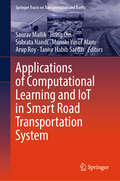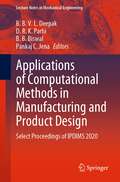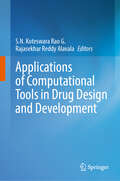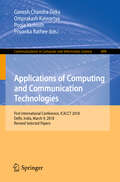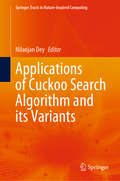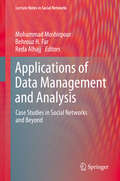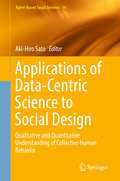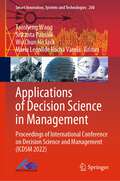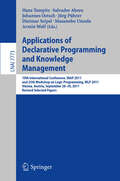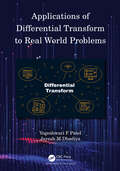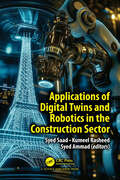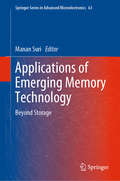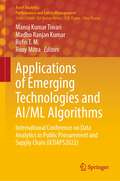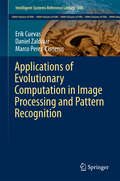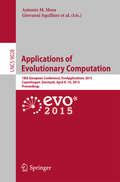- Table View
- List View
Applications of Computational Intelligence
by Juan Carlos Figueroa-García Alvaro David Orjuela-Cañón Julián David Arias-LondoñoThis book constitutes the thoroughly refereed proceedings of the First IEEE Colombian Conference, ColCACI 2018, held in Medellin, Colombia, in May 2018. The 17 full papers presented were carefully reviewed and selected from 60 submissions. The papers are organized in topical sections on artificial neural networks; computational intelligence; computer science.
Applications of Computational Intelligence Techniques in Communications (Advances in Manufacturing, Design and Computational Intelligence Techniques)
by Mridul Gupta, Pawan Kumar Verma, Rajesh Verma and Dharmendra Kr. UpadhyayThe book titled "Applications of Computational Intelligence Techniques in Communications" is a one-stop platform for the researchers, academicians, and people from industry to get a thorough understanding of the latest research in the field of communication engineering. Over the past decade, a manyfold increase in the use of computational intelligence techniques has been identified for obtaining the most optimal and timely solution to a problem. The various aspects covering the significant contribution of numerous computational intelligence techniques have been discussed in detail in this book. Today’s era of machine learning and Internet of Things (IoT) is demanding as high as possible data rate which has resulted into tremendous increased speed of communication. To match-up the pace, the computational intelligence is posing to be the most efficient and favourite tool. The book aims to cover the current technological advancements in the field of communication engineering and give a detailed prospect of computational intelligence to its readers. This book will be a great support to the people working in the field of IoT, machine learning, healthcare, optimization, filter design, 5G and beyond, signal processing etc. The chapters included here will expose its audience to various newly introduced and advanced computational intelligence techniques applicable in communication domain. The readers will be exposed multiple interdisciplinary areas of research in communication and will get the motivation to work in collaboration with other professionals from both the academia and industry.
Applications of Computational Intelligence in Biomedical Technology (Studies in Computational Intelligence #606)
by Radim Bris Jaroslav Majernik Krzysztof Pancerz Elena ZaitsevaThis book presents latest results and selected applications of Computational Intelligence in Biomedical Technologies. Most of contributions deal with problems of Biomedical and Medical Informatics, ranging from theoretical considerations to practical applications. Various aspects of development methods and algorithms in Biomedical and Medical Informatics as well as Algorithms for medical image processing, modeling methods are discussed. Individual contributions also cover medical decision making support, estimation of risks of treatments, reliability of medical systems, problems of practical clinical applications and many other topics. This book is intended for scientists interested in problems of Biomedical Technologies, for researchers and academic staff, for all dealing with Biomedical and Medical Informatics, as well as PhD students. Useful information is offered also to IT companies, developers of equipment and/or software for medicine and medical professionals.
Applications of Computational Intelligence in Concrete Technology (Smart and Intelligent Computing in Engineering)
by Sakshi GuptaComputational intelligence (CI) in concrete technology has not yet been fully explored worldwide because of some limitations in data sets. This book discusses the selection and separation of data sets, performance evaluation parameters for different types of concrete and related materials, and sensitivity analysis related to various CI techniques. Fundamental concepts and essential analysis for CI techniques such as artificial neural network, fuzzy system, support vector machine, and how they work together for resolving real-life problems, are explained. Features: It is the first book on this fast-growing research field. It discusses the use of various computation intelligence techniques in concrete technology applications. It explains the effectiveness of the methods used and the wide range of available techniques. It integrates a wide range of disciplines from civil engineering, construction technology, and concrete technology to computation intelligence, soft computing, data science, computer science, and so on. It brings together the experiences of contributors from around the world who are doing research in this field and explores the different aspects of their research. The technical content included is beneficial for researchers as well as practicing engineers in the concrete and construction industry.
Applications of Computational Intelligence: 4th IEEE Colombian Conference, ColCACI 2021, Virtual Event, May 27–28, 2021, Revised Selected Papers (Communications in Computer and Information Science #1471)
by Juan Carlos Figueroa-García Alvaro David Orjuela-Cañón Julián David Arias-Londoño Jesus A. LopezThis book constitutes revised and extended selected papers of the 4th IEEE Colombian Conference, ColCACI 2021, which was held virtually in Colombia at the end of May 2021.The 7 full papers presented in the volume were carefully reviewed and selected from 22 submissions. The papers are organized in topical sections on biomedical applications and alternative proposals and its applications.
Applications of Computational Intelligence: 5th IEEE Colombian Conference, ColCACI 2022, Cali, Colombia, July 27–29, 2022, Revised Selected Papers (Communications in Computer and Information Science #1746)
by Juan Carlos Figueroa-García Jesus Lopez Alvaro David Orjuela-Cañón Julian David Arias-LondoñoThis book constitutes the refereed proceedings of the 5th IEEE Colombian Conference on Applications of Computational Intelligence, ColCACI 2022, held in Cali, Colombia during July 27–29, 2022.The 7 extended papers included in this book were carefully reviewed and selected from 38 submissions. They were organized in topical sections as follows: Design of a segmentation and classification system for seed detection based on pixel intensity thresholds and convolutional neural networks.
Applications of Computational Intelligence: 6th IEEE Colombian Conference, ColCACI 2023, Bogota, Colombia, July 26-28, 2023, Revised Selected Papers (Communications in Computer and Information Science #1865)
by Alvaro David Orjuela-Cañón Julián David Arias-Londoño Jesus A LopezThis book constitutes the refereed proceedings of the 6th IEEE Colombian Conference on Applications of Computational Intelligence, ColCACI 2023, held in Bogota, Colombia during July 2023.A total of 11 full papers were carefully reviewed and selected from 42 submissions. They were organized in topical sections as follows: Biomedical Applications, Biological Applications, Engineering Applications.
Applications of Computational Intelligence: 7th IEEE Colombian Conference, ColCACI 2024, Pamplona, Colombia, July 17–19, 2024, Revised Selected Papers (Communications in Computer and Information Science #2212)
by Alvaro David Orjuela-Cañón Oscar J. Suarez Jesus A. LopezThis book CCIS 2212 constitutes the referred proceedings of the 7th IEEE Colombian Conference on Applications of Computational Intelligence, ColCACI 2024, held in Pamplona, Colombia, during July 17–19, 2024. The 11 full papers were carefully reviewed and selected from 35 submissions. They explore various topics in the area of computational intelligence (CI), such as solar and photovoltaic forecasting, microseismical signal analysis, LLM performance analysis, evolution in translate systems, recognition of actors and peacebuilding, control in autonomous vehicles, and electroencephalography signals analysis.
Applications of Computational Intelligence: Second IEEE Colombian Conference, ColCACI 2019, Barranquilla, Colombia, June 5-7, 2019, Revised Selected Papers (Communications in Computer and Information Science #1096)
by Juan Carlos Figueroa-García Alvaro David Orjuela-Cañón Julián David Arias-LondoñoThis book constitutes the thoroughly refereed proceedings of the Second IEEE Colombian Conference, ColCACI 2019, held in Barranquilla, Colombia, in June 2019. The 21 full papers presented were carefully reviewed and selected from 59 submissions. The papers cover such topics as video processing; biomedical systems; image processing, etc.
Applications of Computational Intelligence: Third IEEE Colombian Conference, ColCACI 2020, Cali, Colombia, August 7-8, 2020, Revised Selected Papers (Communications in Computer and Information Science #1346)
by Juan Carlos Figueroa-García Jesus Lopez Alvaro David Orjuela-Cañón Julián David Arias-LondoñoThis book constitutes revised and extended selected papers of the Third IEEE Colombian Conference, ColCACI 2020, held in Cali, Colombia, August 2020. Due to the COVID-19 pandemic the conference was held online. The12 full papers presented were carefully reviewed and selected from 65 submissions. The papers are organized in topical sections on earth sciences applications; biomedical and power applications; alternative proposals and its applications.
Applications of Computational Learning and IoT in Smart Road Transportation System (Springer Tracts on Transportation and Traffic #22)
by Hong Qin Saurav Mallik Tanvir Habib Sardar Subrata Nandi Munshi Yusuf Alam Arup RoyThis book discusses machine learning and AI in real-time image processing for road transportation and traffic management. There is a growing need for affordable solutions that make use of cutting-edge technology like artificial intelligence (AI), machine learning (ML), and the Internet of Things (IoT). The efficiency, sustainability, and safety of transport networks can be greatly increased by implementing an Internet of Things (IoT) and machine learning (ML)-based smart road transport system. Install sensors on roadways and intersections to gather data on traffic conditions in real time, such as vehicle density, speed, and flow. Predicting traffic patterns is done by analyzing the gathered data using machine learning algorithms. This can lessen traffic, enhance overall traffic management, and optimize traffic signal timings. Vehicles equipped with Internet of Things devices can have their health monitored in real time. Parameters including lane changes, brake condition, tire pressure, and engine performance can all be monitored by sensors. Based on the gathered data, ML models are used to forecast probable maintenance problems. By scheduling preventive maintenance, failures can be avoided and overall road safety can be increased. Create a smartphone app that would enable drivers to locate parking spots in their area. To forecast parking availability based on past data, the time of day, and special events, apply machine learning algorithms. Integrate Internet of Things (IoT) sensors into fleet vehicles to monitor their performance, location, and fuel consumption. To maximize fleet efficiency, reduce fuel consumption, and plan routes more effectively, apply machine learning algorithms. Train ML models to forecast the quickest and most efficient routes with the help of historical data analysis. Route recommendations for drivers or fleet management systems can be constantly adjusted with real-time updates, which contain real-time data on road conditions, accidents, and construction. To guarantee smooth integration and efficient implementation, government organizations, transportation providers, and technology firms must work together.
Applications of Computational Methods in Manufacturing and Product Design: Select Proceedings of IPDIMS 2020 (Lecture Notes in Mechanical Engineering)
by B. B. Biswal Pankaj C. Jena B. B. V. L. Deepak D. R. K. ParhiThis book presents the select proceedings of the conference of Innovative Product Design and Intelligent Manufacturing System (IPDIMS 2020), held at the National Institute of Technology, Rourkela, India. The book addresses latest methods and advanced tools from different areas of design and manufacturing technology. The main topics covered include computational methods for robotics, mechatronics and human-computer interaction; computer-aided design, manufacturing and engineering; aesthetics, ergonomics and UX/UI design; smart manufacturing and expert systems. The contents of this book will be useful for researchers as well as professionals working in the areas of industrial design, mechatronics, robotics, and automation.
Applications of Computational Tools in Drug Design and Development
by S. N. Koteswara Rao G. Rajasekhar Reddy AlavalaThis book provides a comprehensive overview of the role of computers and computational tools at different stages of drug discovery and development. Designed to meet the needs of a beginner to advanced learner, the book provides the information on the tools, how they work, with the latest reports on applications in drug design, drug delivery and building network pharmacology models. Part I explores the pharmacological aspects, covering computational simulation of drug delivery at the molecular level, modeling for formulation design, and the revolutionary use of computational fluid dynamics in pharmaceutical processes. Specific applications such as pharmaceutical die filling processes, inhalation aerosol-based targeted drug delivery, and the development of inhalation compounds using in silico modeling tools are discussed. The use of computational tools in cheminformatics and their application in preformulation perspectives for drug delivery are also included. Part II expands the scope to include solubility prediction, absorption prediction, protein binding prediction, bio-permeability prediction, toxicity prediction, and metabolism prediction. It covers the identification of potential sites of metabolism in lead molecules and computer-assisted simulation studies to understand drug-polymer interactions. Recent advances in drug likeness screening using software and online tools are also reviewed. Part III focuses on specific therapeutic areas. <span class=
Applications of Computing and Communication Technologies: First International Conference, Icacct 2018, Delhi, India, March 9 2018 (Communications In Computer And Information Science #899)
by Ganesh Chandra Deka Omprakash Kaiwartya Pooja Vashisth Priyanka RatheeThis book (CCIS 899) constitutes the refereed proceedings of the First International Conference on Applications of Computing and Communication Technologies, ICACCT 2018, held in Delhi, India, in March 2018. The 30 full papers were carefully reviewed and selected from 109 submissions. The papers are organized in topical sections on communication and system technologies, computing and network technologies, application and services.
Applications of Cuckoo Search Algorithm and its Variants (Springer Tracts in Nature-Inspired Computing)
by Nilanjan DeyThis book highlights the basic concepts of the CS algorithm and its variants, and their use in solving diverse optimization problems in medical and engineering applications. Evolutionary-based meta-heuristic approaches are increasingly being applied to solve complicated optimization problems in several real-world applications. One of the most successful optimization algorithms is the Cuckoo search (CS), which has become an active research area to solve N-dimensional and linear/nonlinear optimization problems using simple mathematical processes. CS has attracted the attention of various researchers, resulting in the emergence of numerous variants of the basic CS with enhanced performance since 2019.
Applications of Data Management and Analysis: Case Studies in Social Networks and Beyond (Studies in Big Data #27)
by Reda Alhajj Mohammad Moshirpour Behrouz H. FarThis book addresses and examines the impacts of applications and services for data management and analysis, such as infrastructure, platforms, software, and business processes, on both academia and industry. The chapters cover effective approaches in dealing with the inherent complexity and increasing demands of big data management from an applications perspective.Various case studies included have been reported by data analysis experts who work closely with their clients in such fields as education, banking, and telecommunications. Understanding how data management has been adapted to these applications will help students, instructors and professionals in the field. Application areas also include the fields of social network analysis, bioinformatics, and the oil and gas industries.
Applications of Data-Centric Science to Social Design: Qualitative and Quantitative Understanding of Collective Human Behavior (Agent-Based Social Systems #14)
by Aki-Hiro SatoThe intention behind this book is to illustrate the deep relation among human behavior, data-centric science, and social design. In fact, these three issues have been independently developing in different fields, although they are, of course, deeply interrelated to one another. Specifically, fundamental understanding of human behavior should be employed for investigating our human society and designing social systems. Insights and both quantitative and qualitative understandings of collective human behavior are quite useful when social systems are designed. Fundamental principles of human behavior, theoretical models of human behavior, and information cascades are addressed as aspects of human behavior. Data-driven investigation of human nature, social behavior, and societal systems are developed as aspects of data-centric science. As design aspects, how to design social systems from heterogeneous memberships is explained. There is also discussion of these three aspects—human behavior, data-centric science, and social design—independently and with regard to the relationships among them.
Applications of Decision Science in Management: Proceedings of International Conference on Decision Science and Management (ICDSM 2022) (Smart Innovation, Systems and Technologies #260)
by Srikanta Patnaik Taosheng Wang Maria Leonilde Rocha Varela Wu Chun Ho JackThis book covers research trends of data science and management involving cutting edge technologies and novel research directions from diverse fields of industries, business and government sectors. It involves usage of various advanced tools and techniques for understanding different data collected at the grassroot level to generate actionable insights for making crucial decisions. This book aims to serve as a reference book for researchers in the area of decision science for management. It covers alternative solutions with innovative ideas and issues from different fields of business management.
Applications of Declarative Programming and Knowledge Management: 19th International Conference, INAP 2011, and 25th Workshop on Logic Programming, WLP 2011, Vienna, Austria, September 28-30, 2011, Revised Selected Papers (Lecture Notes in Computer Science #7773)
by Hans Tompits Salvador Abreu Johannes Oetsch Jörg Pührer Dietmar Seipel Masanobu Umeda Armin WolfThis book constitutes revised selected papers of the 19th International Conference on Applications of Declarative Programming and Knowledge Management, INAP 2011, and the 25th Workshop on Logic Programming, WLP 2011, held in Vienna, Austria, in September 2011. The 19 papers presented in this volume were carefully reviewed and selected from 27 papers presented at the conference and initially a total of 35 submissions. The book also contains the papers of two invited talks. The papers are organized in topical sections on languages; answer-set programming and abductive reasoning; constraints and logic programming; answer-set programming and model expansion; application papers; and system descriptions.
Applications of Differential Transform to Real World Problems
by Yogeshwari F Patel Jayesh M DhodiyaThis book is an invaluable resource for applied researchers to find the analytical solution of differential equations describing the dynamical system with less computational effort and time. It describes the basic concepts of the differential transform method and solution of various real-world problems described by simple to complicated differential equations. It provides a computational technique that is not only conceptually simple and easy to use but also readily adaptable for computer coding. Different chapters of the book deal with the basic differential equations involved in the physical phenomena as well as a complicated system of differential equations described by the mathematical model.The book offers comprehensive coverage of the most essential topics, including Basic concepts and fundamental properties of the proposed technique with proof The solution of linear, nonlinear, homogeneous, and nonhomogeneous ordinary differential equations (ODEs) and partial differential equations (PDEs) The initial and boundary value problems Real-world ODE and PDE problems are also discussed Applications of Differential Transform to Real World Problems is primarily aimed at undergraduates, graduates, and researchers studying differential equations. Scientists dealing with complicated differential equations or systems of differential equations will also find this book useful.
Applications of Digital Twins and Robotics in the Construction Sector
by Syed Saad Syed Ammad Kumeel RasheedThis book provides insights to the lay person as well as the experts who are actively enabling these changes in the construction industry. The book explores digital twins and robots in the construction sector, and how they are revolutionizing this field. It comprises chapters that begin with the basics before going upstream. Digital Twins are important in the planning and design of projects where, real-time simulation, visualization and data-driven decision-making are done. Furthermore, robotics play a significant role in on-site execution, thus automating construction operations, and guaranteeing accuracy and safety. The book discusses the harmony of digital twinning and robotics, showing that these two are complementary with regard to enhancing efficiencies on-site, in monitoring progress and live control.Applications of Digital Twins and Robotics in the Construction Sector covers the current applications of these technologies and forecasts future applications, exposing readers to breakthrough innovations transforming this field. It aims inform all readers, expert or simply interested and inquisitive about digital twins and construction robots’ transformation.
Applications of Emerging Memory Technology: Beyond Storage (Springer Series in Advanced Microelectronics #63)
by Manan SuriThe book intends to bring under one roof research work of leading groups from across the globe working on advanced applications of emerging memory technology nanodevices. The applications dealt in the text will be beyond conventional storage application of semiconductor memory devices. The text will deal with material and device physical principles that give rise to interesting characteristics and phenomena in the emerging memory device that can be exploited for a wide variety of applications. Applications covered will include system-centric cases such as – caches, NVSRAM, NVTCAM, Hybrid CMOS-RRAM circuits for: Machine Learning, In-Memory Computing, Hardware Security - RNG/PUF, Biosensing and other misc beyond storage applications. The book is envisioned for multi-purpose use as a textbook in advanced UG/PG courses and a research text for scientists working in the domain.
Applications of Emerging Technologies and AI/ML Algorithms: International Conference on Data Analytics in Public Procurement and Supply Chain (ICDAPS2022) (Asset Analytics)
by Manoj Kumar Tiwari Madhu Ranjan Kumar Rofin T. M. Rony MitraThis book provides practical insights into applications of the state-of-the-art of Machine Learning and Artificial Intelligence (AI) for solving intriguing and complex problems in procurement and supply chain management. The application domain includes perishable food supply chain, steel price prediction, electric vehicle charging infrastructure design, contract price negotiation, reverse logistics network design, and demand forecasting. Further, the book highlights the advanced topics in the procurement field, like AI in green procurement and e-procurement in the pharma sector. Furthermore, the book covers applications of well-established methodologies such as heuristics, optimization, game theory, and MCDM based on the nature of the problem. The inclusion of the vaccine supply chain digital twin and blockchain-based procurement signals the significance of the book. This book is a comprehensive guide for industry professionals to understand the power of data analytics, enabling them to improve efficiency and effectiveness in the procurement and supply chain sectors.
Applications of Evolutionary Computation in Image Processing and Pattern Recognition (Intelligent Systems Reference Library #100)
by Erik Cuevas Daniel Zaldívar Marco Perez-CisnerosThis book presents the use of efficientEvolutionary Computation (EC) algorithms for solving diverse real-world imageprocessing and pattern recognition problems. It provides an overview of thedifferent aspects of evolutionary methods in order to enable the reader inreaching a global understanding of the field and, in conducting studies onspecific evolutionary techniques that are related to applications in imageprocessing and pattern recognition. It explains the basic ideas of the proposedapplications in a way that can also be understood by readers outside of thefield. Image processing and pattern recognition practitioners who are notevolutionary computation researchers will appreciate the discussed techniquesbeyond simple theoretical tools since they have been adapted to solvesignificant problems that commonly arise on such areas. On the other hand,members of the evolutionary computation community can learn the way in whichimage processing and pattern recognition problems can be translated into anoptimization task. The book has been structured so that each chapter can beread independently from the others. It can serve as reference book for studentsand researchers with basic knowledge in image processing and EC methods.
Applications of Evolutionary Computation: 18th European Conference, EvoApplications 2015, Copenhagen, Denmark, April 8-10, 2015, Proceedings (Lecture Notes in Computer Science #9028)
by Giovanni Squillero Antonio M. MoraThis book constitutes the refereed conference proceedings of the 18th International Conference on the Applications of Evolutionary Computation, EvoApplications 2015, held in Copenhagen, Spain, in April 2015, colocated with the Evo 2015 events EuroGP, EvoCOP, and EvoMUSART. The 72 revised full papers presented were carefully reviewed and selected from 125 submissions. EvoApplications 2015 consisted of the following 13 tracks: EvoBIO (evolutionary computation, machine learning and data mining in computational biology), EvoCOMNET (nature-inspired techniques for telecommunication networks and other parallel and distributed systems), EvoCOMPLEX (evolutionary algorithms and complex systems), EvoENERGY (evolutionary computation in energy applications), EvoFIN (evolutionary and natural computation in finance and economics), EvoGAMES (bio-inspired algorithms in games), EvoIASP (evolutionary computation in image analysis, signal processing, and pattern recognition), EvoINDUSTRY (nature-inspired techniques in industrial settings), EvoNUM (bio-inspired algorithms for continuous parameter optimization), EvoPAR (parallel implementation of evolutionary algorithms), EvoRISK (computational intelligence for risk management, security and defence applications), EvoROBOT (evolutionary computation in robotics), and EvoSTOC (evolutionary algorithms in stochastic and dynamic environments).
